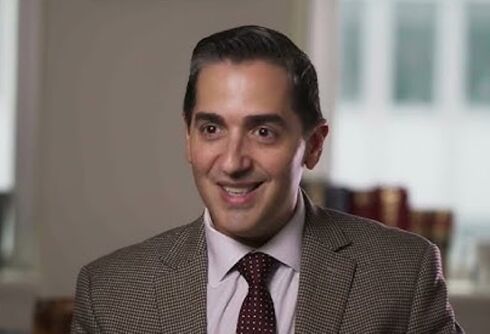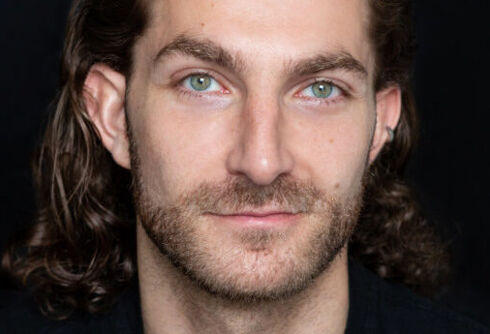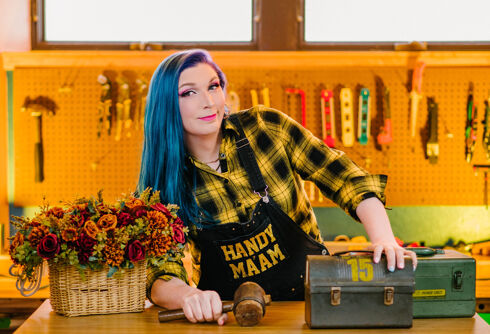This is the second article in “We Dream On,” a three-part profile of actress, singer, and civil rights icon Donzaleigh Abernathy, the daughter of Juanita and Rev. Ralph Abernathy, who were civil rights leaders and close allies to Dr. Martin Luther King, Jr. We spoke to Abernathy shortly after Georgia elected two pro-LGBTQ Senators, tipping the Senate to Democrats, and a mob stormed the United States Capitol as Congress certified the 2020 presidential election. [Read part I.]
Donzaleigh Abernathy told us with certainty that her father Ralph, Dr. Martin Luther King, and other Black civil rights leaders would support LGBTQ rights. She witnessed them defending LGBTQ people, some of whom she grew up with.
Donzaleigh’s voice boomed while sharing stories about the openly queer people that she’s known throughout her life, from the days of the Civil Rights Era until today. After hearing her talk about them, LGBTQ Nation sat down with one queer person in Donzaleigh’s life who exclusively shared her own incredible story in the often overlapping LGBTQ and civil rights movements for equality.
While the fight to end discrimination based on gender identity or sexual orientation was largely underground America until the Stonewall riots of 1969, the Black movement and the queer rights movement intersected much earlier than is commonly believed.
Never Miss a Beat
Subscribe to our newsletter to stay ahead of the latest LGBTQ+ political news and insights.
Related: 6 organizations to donate to in the spirit of Dr. Martin Luther King Jr.
“We had ministers of music at our church, who were openly gay men. And the deacons came to my father – shortly after uncle Martin had passed, but still the 60s, and they were wanting my father to get rid of the minister of music [for being gay],” Donzaleigh told us.
“My father said, ‘Absolutely not, he’s talented, and that’s all that matters. He’s talented, he’s not harming anybody, he is only giving to us and uplifting our religious experience. And he will stay.’ And my father was very firm about that.”
The family defends gay people
Dr. Abernathy’s defense of gay people in his own church in the south was not popular, nor the norm, at that time and that place. But his ministers would not be the only queer people he would fight for. That’s just part of why, for Donzaleigh, being an ally is more than a calling — it’s a necessity. It’s part of her family history.
“I also have transgender members of my family and we love them because they are who they are,” she unequivocally stated. “We love them how they are, we accept them, and we fight for them, and we march for them. And for anybody who isn’t on the right page, I’m sorry.”
While she doesn’t remember having the opportunity to have an at-length conversation with Black gay activist and organizer Bayard Rustin, Donzaleigh told LGBTQ Nation that before Dr. Abernathy passed away in 1990, “Daddy was very clear that we understand what had happened to Bayard and why he had to leave: because of discrimination.”
But there would be many other openly queer people she would have the opportunity to become close with in life, even as far back as the 1960s — long before the Stonewall riots, the days of Harvey Milk, or any semblance of an LGBTQ movement took the stage.
Talking about her trans family member, Donzaleigh told us, “my cousin came to the world the way she is. She was in a male body, but there was a female inside of her that was greater, and we knew when she started walking that she was female.
“So she did everything in her power to conform [to her gender assigned at birth], but that made her miserable… and so now I’m so happy because she’s had surgery and she lives her life as a female. and she’s beautiful, and she’s happy and she’s free.”
For the love of trans friends and family
Princess Brandy is another prominent queer person in Donzaleigh’s life. Donzaleigh described her as her “dearest friend” whom she “couldn’t imagine life without.”
Through both of her marriages, Donzaleigh told us that Brandy “was right there with me, doing [my] makeup and getting me ready for my wedding…” Donzaleigh laughed, “no one else was there with me — I mean, my mother was in and out of the room! But Brandy was right there with me.”
Brandy not only grew up with Donzaleigh, but she also witnessed the Civil Rights movement and the birth of the modern LGBTQ community, and she is a trailblazing queer person in her own right.
LGBTQ Nation had a chance to sit down with Brandy after Donzaleigh connected us. “Dr. King was my first ‘Santa Claus’ I ever met,” Brandy casually confided to me.
When I asked how she identified, Brandy told me, “I never picked a label. People ask me all the time, and if we had to say something, I would probably say transgender.”
“It got to the point where I had started lookin’ so feminine when I was going to the men’s restroom, people would start whispering and when I was coming out they thought they were going into the women’s restroom,” she said.
Brandy told us about growing up as a boy and previously identifying as gay in the South. Brandy described herself to LGBTQ Nation as a feminine trans person, and as Donzaleigh did in her interview, we use she and her pronouns to describe her.
Brandy described growing up in Atlanta, now often referred to as the “Black LGBTQ capital of the world,” before the LGBTQ community was welcomed in the city.
“[Me and Donzaleigh] lived in the same community, which is called Collier Heights, and Collier Heights was… was designed by a Black man for Black people,” Brandy said.
“The first community in the whole United States that was specially designed for Black people. So, Dr. Abernathy, Dr. King, Reverend [William Vincent] Guy — the pastor at Friendship Baptist Church where Spelman College was founded — lived there. All kinds of black things and people originated from our community. Like Herman Russell, the first Black billionaire in Atlanta.”
Brandy lives there to this day.
During their childhood, Brandy would get to know and grow close to the King family, and later to the Abernathy family. There would be many tales the Black children in Collier Heights could tell — like the time that Brandy, Donzaleigh, and her siblings traveled to Biloxi, Mississippi, for an SCLC convention organized by Ralph.
“I’ll never forget, I wrote my will. I thought we were going to all die out there in Mississippi. Sure enough, they did burn a cross on the lawn of our hotel where we were, down in Biloxi,” Donzaleigh recalls. “Brandy was in the room and shared it with me. At that point, granted, she was not [out as] female at the time, but she was still Brandy. I love her.”
Brandy met Donzaleigh when they attended Northside High School for the Performing Arts. Northside was a prominent school before it consolidated with North Fulton High School in the 1990s. Notable alumni, especially from Brandy and Donzaleigh’s time, include RuPaul A. Charles. (Neither mentioned him, though.)
They two grew close since they both hoped to become actors.
Into early adulthood, Brandy remembered, “I was in the closet a long time because gay people were just not accepted. I remember going to some of the gay clubs and I would sit outside, I wouldn’t even go in. I just didn’t want to run into anybody I knew.”
Eventually, Brandy mustered the courage to enter. There, she saw “female impersonators” on stage, and met Dina Jacobs, who would become Brandy’s gay mom.
“You know how people say ‘association brings on insinuation’ and I used to think ‘Nah, that’s not true…’ but now, I believe it’s true,” Brandy beamed. “The more I was around her, the more I wanted to become an entertainer as well. I’ve always wanted to act but, when I met her, it was like, ‘Okay I can do this,’ and it kind of, like, cultivated through the years.”
That started Brandy’s exploration of other creative endeavors — and a turning point in her understanding of her identity.
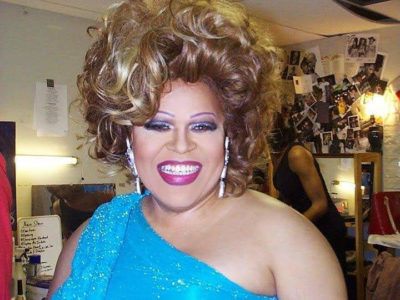
“We just wanted to live our life as normal people”
Donzaleigh had another gay friend, Harold, that also grew up with her during the Civil Rights era. He would change her life and helped her survive. Their friendship paralleled the way in which the gay rights and civil rights movement began to merge, slowly but surely, starting in the late ’60s.
“One of the previous ministers at our dad’s church, before my dad became the pastor, he had a son. His son was gay, and he became a member of our family, he helped and worked for my mother and my father. Harold — I loved him, I loved him with all my heart and soul. You know, he was my brother.”
Donzaleigh went North to study at Emerson College in Boston, and by the 1980s, she was right in the mecca of both entertainment, Black, and LGBTQ culture: New York City.
There, “right at 66th Street, at those high rise towers by the Lincoln Center,” she lived for a time with Harold, in a scenario that could have been ripped from the pages of a James Baldwin novel. “He taught me how to dance, I understood his life and I understood his plight. The people of Atlanta, they could never know that he was gay. I lived in that world with him, and all of his friends.”
At the time, New York was the place to be in the creative universe, although Los Angeles was the home of most major film production and was booming in the television world. Outside of video, the best in theater, music, and dance had to make a name for themselves in the Big Apple.
As shown in films such as Paris is Burning and period dramas such as the hit show Pose, queer people around the world recognized that the city was one of the few relatively safe places where they could openly be themselves, although discrimination and inequities, especially on the basis of race, remained persistent. But something else would come to New York at that time, and it would hit home for Harold and Donzaleigh.
“Ultimately,” she recounted, “we lost him to that horrible AIDS.”
“It was absolutely horrible and devastating. I loved him, and whatever he went through, I went through with him,” she said. “I still carry Harold in my heart and soul. My mother does as well, and my sister and my brothers, and so we were always open-minded.”
In New York, Donzaleigh landed at least one Off-Off-Broadway role, but she didn’t book a major acting role. That would come later.
In the same period in Atlanta, Brandy had made a habit out of volunteering for political campaigns and grassroots efforts, as she did at Dr. King’s birth home. She would continue on helping at the King Center when its physical location came to fruition.
“The nice thing about volunteering is nobody can really say nothing offensive to you,” she said with a laugh, “so a lot of times when I was volunteering I got the utmost respect because I had worked on everybody’s campaign in Atlanta, and because of Donzaleigh and [Donzaleigh’s sister] Juandalynn and Ralph and the Abernathys, they knew me [around] there.”
Brandy volunteered for former U.S. Ambassador Andrew Young, who would run and win two terms as mayor of Atlanta starting in 1982. Coretta Scott King was one of the most prominent leaders to push her husband’s former ally to run for the office.
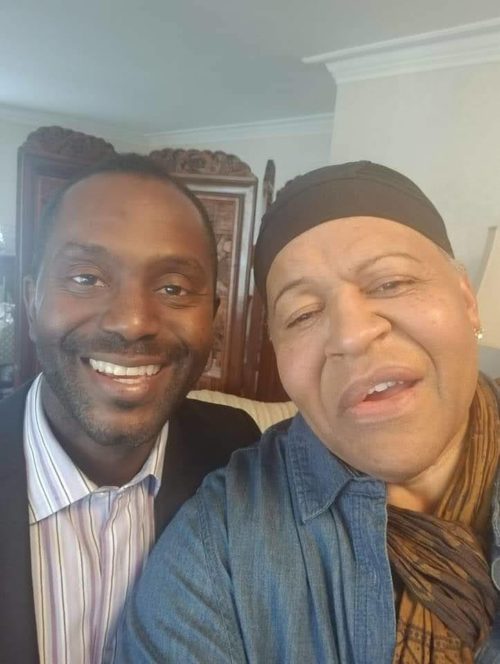
Black and queer
Around this time, Brandy would also begin navigating the difficulties of being both Black and queer. In her youth, the struggle was much more about her race.
“Those of us who happened to be gay, transgender or whatever, we just wanted to live our life as normal people, doing what we needed to do. I think the struggle that came wasn’t so much about being gay or progress for LGBTQ [people], but it was more in being Black, learning how to survive in that world and the community,” she recalled.
By the 1980s, things began to change.
While systemic anti-Black racism began to fade in Atlanta, especially as the city experienced an influx of Black people, queer people — especially Black, femme, queer people — faced even more outright discrimination and bigotry. There was a general disdain for feminine people within the LGBTQ community on top of the hatred from outside of the community.
“People pretend that ‘we are one’ and all this stuff but at the end of the day it was not always the same. White gay men did not always appreciate and respect Black gay men. And gay people period didn’t like drag queens, didn’t like female impersonators, or ‘trannies’ at all. Not all of them, but a great deal of them.”
“Gay [and] trans people went to jail for using the ladies restroom out and around,” she pointed out. “I have several friends that went to jail. We were all in IHOP one night and one of my trans girlfriends went to the ladies restroom, and someone called the cops on her and she went to jail.”
When asked how she navigated those times, Brandy took a beat before answering, “I think a lot of times when you’re in the moment, you don’t look at yourself as ‘navigating.’ You do whatever it takes to survive.”
Brandy would continue her creative endeavors, despite the difficulties. “My mother was a seamstress so I was always interested in fabric,” she said. A friend — who has since come out as gay — invited Brandy to take part in an initiative by the Georgia Film Initiative to diversify Atlanta’s much smaller, and much newer, film industry. So she began volunteering on movie sets, too.
“I was working on a film called Go Tell It on the Mountain, I think, or For Us the Living [(The Medgar Evers Story)],” she shared, “and I heard a producer say ‘We’re trying to get this location and we can’t get it…’ So I said, ‘What location are you trying to get?’ they said, ‘We’re trying to get this location in downtown Atlanta…’ And I said, ‘Tell me what you need.’”
Brandy would call Sandra Walker, the press secretary for Mayor Young. “I said ‘Sandra, I’m working on this movie. Can you help me get this location?” Walker made some calls herself, and that led to the film producers getting their location.
“They thought I had hit gold, and that I was it. Next thing you know, I did work on motion pictures/films for 15 years straight, non-stop, because people were calling me asking me to help them with their films,” Brandy laughed. “It’s so funny how it has transpired and moved. When I first started working on movies, wasn’t no Black people coming along… you look at it now, the sets are just as equally Black as they were white, and then you have double the [Black people] in hair and makeup and props.”
School Daze
Another film that came to Atlanta in the mid-80s that Brandy worked on: School Daze.
“I worked with Ruth [Carter] on School Daze and I made the jewelry for Tisha Campbell and Jasmine Guy for the ‘I Don’t Want to Be Alone Tonight’ scene,” Brandy shared.
That would become Spike Lee’s breakout film and it would change Atlanta and its entertainment industry forever. Carter would go on to win an Academy Award for costume design on the 2018 film Black Panther – also filmed in Atlanta.
Brandy would also tell us, “Donzaleigh was supposed to work on School Daze. A lot of the directors knew of Donzaleigh and that she wanted to be an actress, and she deserved to be an actress.”
But, “it was told to her if you’re gonna be an actress, then act, you can’t do production and act at the same time. So they kind of blackballed her from doing production so it ended up that she did not do the movie.”
Hindsight may lead some to believe that Donzaleigh missed her own “breakout” moment by not getting a part in the film.
“I used to tell her, ‘Look at it as a blessing instead of a hindrance and use it, because one day you’re gonna move from an actress to director and then eventually you’re gonna produce your own project.’ By knowing what goes on behind the scenes, you’re able to facilitate and make sure things are in the way [they’re supposed to be done,]” Brandy told her.
The wisdom Brandy shared with Donzaleigh would eventually come full circle.
Part three of the three-part series “We Dream On” appeared on May 14.
Don't forget to share:








